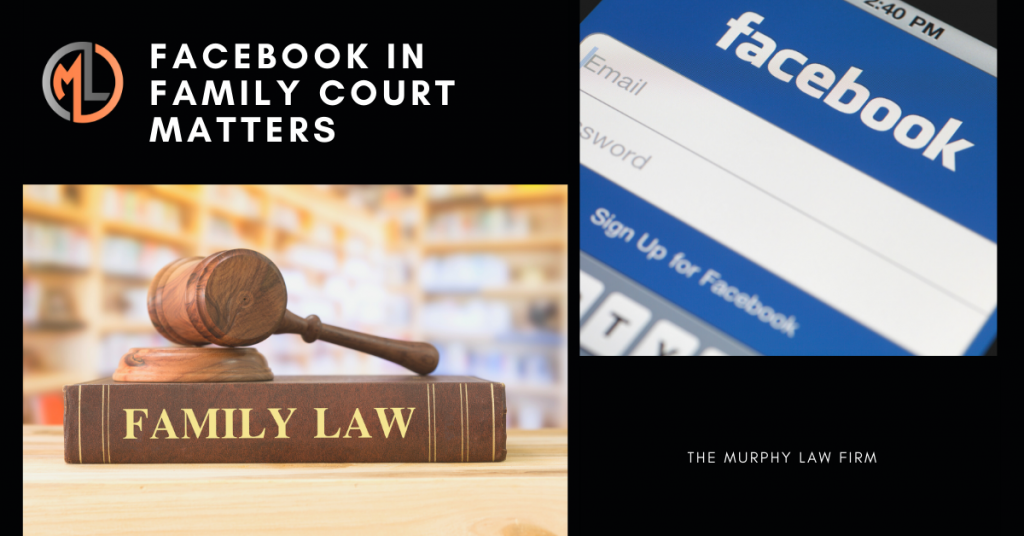Facebook's Role in our Lives
Facebook is an online social media platform that allows users to interact, link, communicate, and connect with other users from around the world. Through photo uploads, status updates, and videos. Moreover, users can keep-in-touch with family, friends, professional colleagues, and acquaintances. Facebook has attracted society as we know it; with nearly two billion users worldwide. No wonder why this social media powerhouse found its way into a majority of educational, societal, and cultural spaces. Nevertheless, learning the importance of using social media impacts family court matters.
Facebook Use in Family Court Matters
Statistics on the use of Facebook in family law matters:
- Facebook evidence is used in 20% of custody proceedings;
- 1 in 5 divorces are blamed on Facebook;
- 66% of attorneys cite Facebook as the primary source for online divorce evidence used by or against them in court;
Furthermore, people must continuously inform themselves about the legal impact that social media can have on their familial ties and bonds. Specifically, special attention is drawn to the legal outcomes that a “virtual identity” can have on your “actual identity.” In short, one post on social media can lead to victory or defeat in family court matters.
6 Tips on using Facebook, Involving in Family Court Matters
It is important to take preventative measures to avoid jeopardizing your case. In addition, here are 6 tips to think about before "posting" on Facebook:
1. Refrain from posting inappropriate content about your ex-spouse, child, or any other involved-person if you are a party to a family court proceeding.
- In family court, Facebook can affect custody, spousal maintenance, divorce settlements, and visitation limitations of the parents.
2. Facebook posts can be used to show that the opposing party in a family court matter is an excessive spender, an irresponsible or unfit parent, or, that the other party is a drug or alcohol dependent.
- In family court, you should be aware of posts that reveal: major purchases if involved in child support and alimony proceedings; lifestyle choices if involved in a custody battle; new romances if involved in a divorce settlement; and, private conversations in any type of case. The goal is to avoid giving the opposing party damaging information that can be used against you in court.
3. Erase the idea of having privacy based on settings and think of Facebook as a public space that anyone can access.
- Aside from your security settings, Facebook poses a special threat. To anyone using it as a medium to communicate. As a result, you can't guarantee things right away that the information is completely gone once you hit “delete.”
4. Avoid making Facebook posts and statuses in moments of anger.
- These kinds of posts misinterpret easily by active users. It portrays you in a negative light. You can limit your posts according to your personal preference. Deciding on posting on Facebook involving a family court matter is quite a risk. Whether you are comfortable with a judge seeing the post when making decisions about your case comes in standards.
5. Deactivate or—at a minimum—“unfriend” the ex-spouse/partner, and anyone who could possibly be associated with their account.
- This preventive measure will not set a limit on any other mutual friends and family’s access. A probable alternative is informing those friends and family members of one’s involvement in a family court conflict and the importance of not engaging you or your ex-spouse on Facebook.
6. Acclimate with the evidence rules used in court that allow this type of evidence in (or keep it out).
- We will feature this topic in our next blog and review some of the important parts of evidential procedures as they relate to Facebook posts.
Eventually, there is no indication that the courts will continue to allow Facebook evidence in family court matters. Undeniably, it is important to have an experienced Maryland family law attorney. Whether you are going through a divorce, a custody battle, and in any other family dispute. Overall, you need an attorney who advocates on your behalf. He/She understands the implications that Facebook can have on your family court matter. Contact Angel Murphy with The Murphy Law Firm, LLC today to schedule your family law matter consultation at (240) 493-9116 or angel@amurphylegal.com. If you are active on social media, Like us on Facebook @AMurphyLegal, Follow us on Instagram @AMurphyLegal, and Twitter @AMurphy_Legal







.webp)











